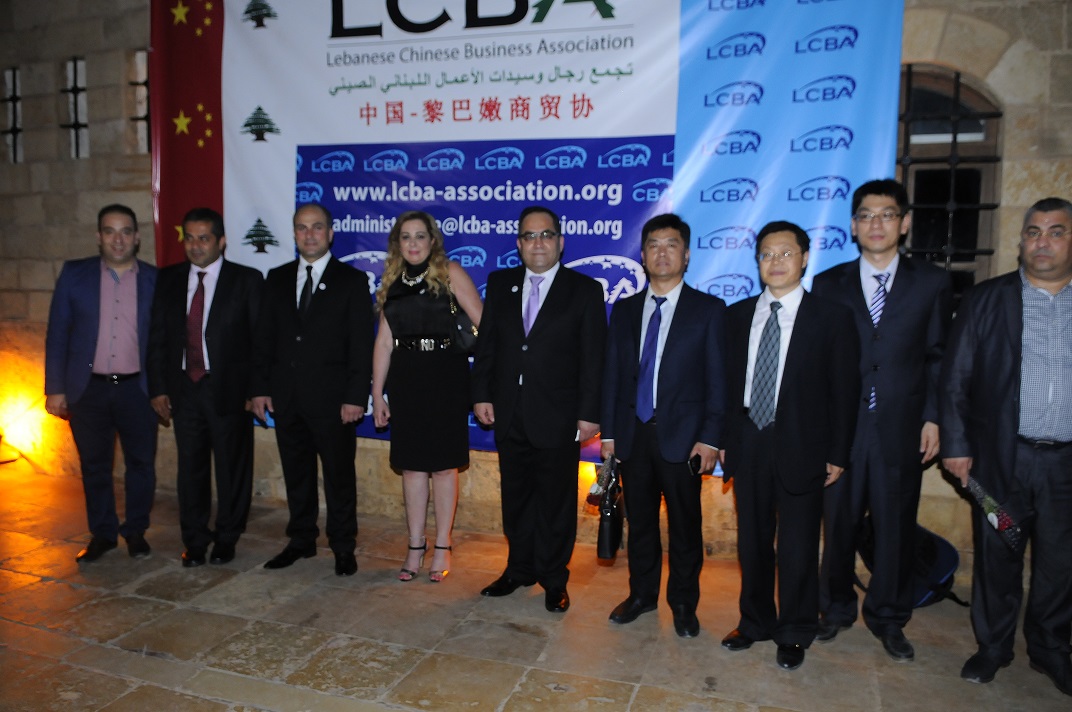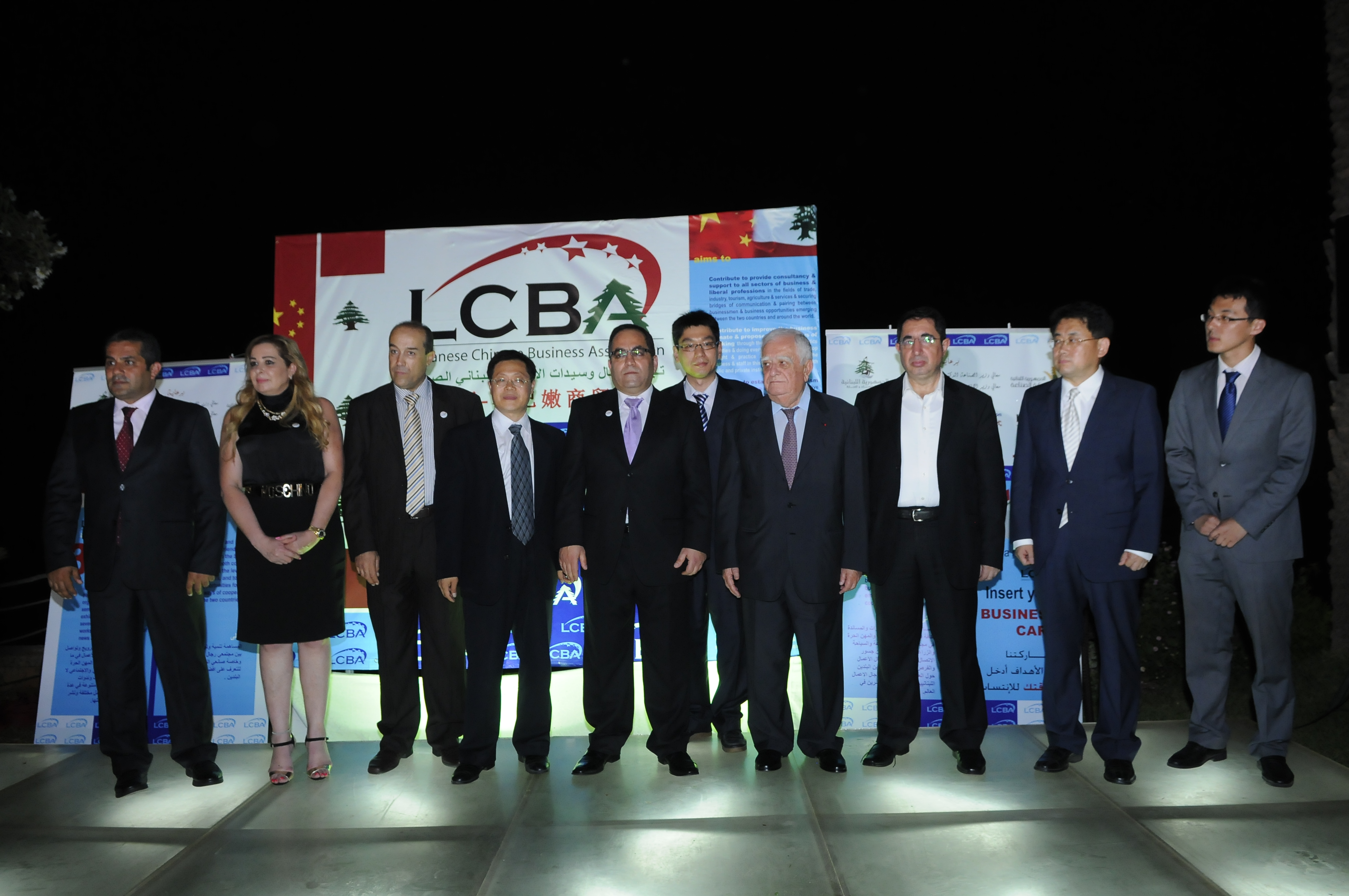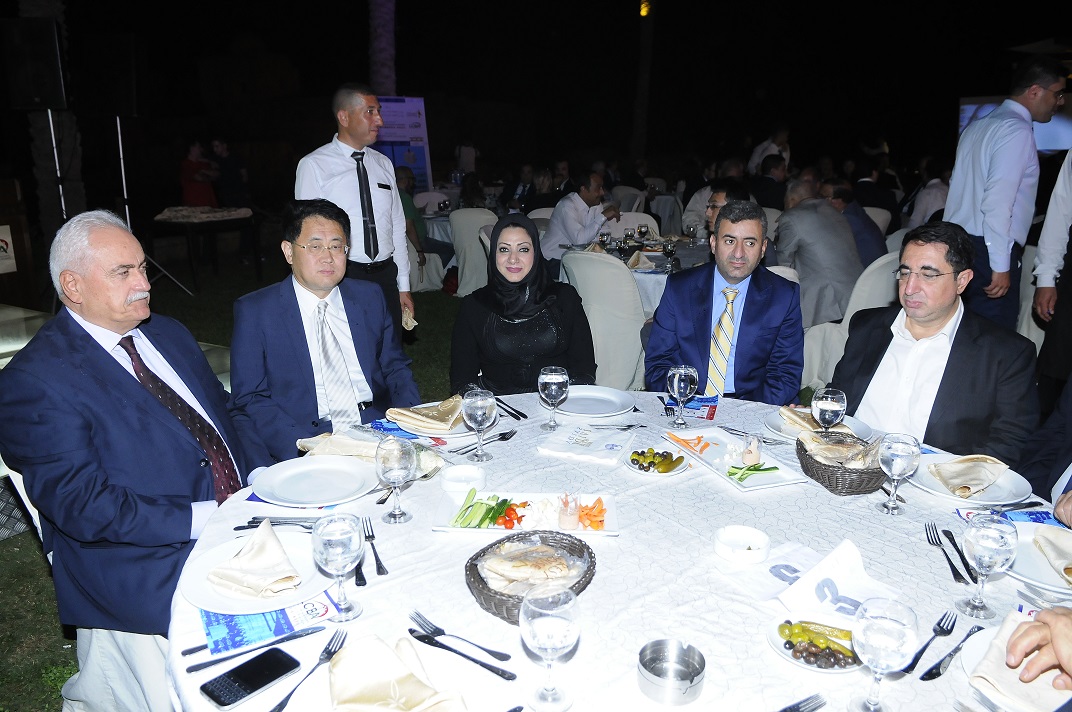LCBA Ceremony in the occasion of the 6th Session of the ARAB CHINESE Businessmen Conference on the occasion of signing an agreement with the Chinese commercial Promotion International Trade (CCPIT)
LCBA Ceremony in the occasion of the 6th Session of the ARAB CHINESE Businessmen Conference on the occasion of signing an agreement with the Chinese commercial Promotion International Trade (CCPIT)



Beirut, May 28, 2015
The Lebanese Chinese Business Association
hosts a dinner for participants in the Arab–Chinese Business Conference and the 4th Investment Forum


The Lebanese Chinese Business Association held a dinner yesterday at the Saida Tourist Rest House in honor of the participants in the 6th Arab–Chinese Businessmen Conference and the 4th Investment Forum, organized under the theme “Building an Economic Belt for the Silk Road”, under the patronage of H.E. Prime Minister Tammam Salam.

The dinner was attended by a large number of officials, members of parliament, ambassadors, and leaders from the private sector, along with Chinese and Arab delegations participating in the conference. Also present were heads of federations, businessmen, and media representatives. Among the attendees were H.E. Minister of Industry Dr. Hussein Hajj Hassan, H.E. Mr. Adnan Kassar, Honorary President of the General Union of Arab Chambers of Commerce, Industry and Agriculture; former Minister Fadi Abboud; MPs Ali Adel Osseiran and Dr. Michel Moussa; H.E. Mr. Jiang Jiang, Ambassador of the People’s Republic of China to Lebanon; H.E. Mr. Wang Heshan, Vice Governor of Ningxia Hui Autonomous Region in China; Mr. Ali Mahmoud Al Abdallah, President of the Lebanese Chinese Businessmen and Businesswomen Association (LCBA); Mr. Mohammad Al Saoudi, Mayor of Saida; and Mr. Mohammad Saleh, President of the Chamber of Commerce, Industry and Agriculture in Saida and the South, in addition to many guests from both public and private sectors.



After a welcoming speech from LCBA President Mr. Ali Mahmoud El Abdallah, Minister of Industry Dr. Hussein Hajj Hassan delivered remarks welcoming the Chinese and Arab guests and businessmen attending the conference. He praised the Lebanese–Chinese relations and expressed appreciation for China’s support for Lebanon and just Arab causes. Minister Hajj Hassan also called on China to assist in boosting Lebanese exports to China.

Signing of the Agreement
The dinner also witnessed the signing of a cooperation agreement between the Lebanese Chinese Business Association (LCBA) and the China Council for the Promotion of International Trade (CCPIT).
The signing ceremony was attended by Minister of Industry Dr. Hussein Hajj Hassan, H.E. Mr. Adnan Kassar, Chinese Ambassador Mr. Jiang Jiang, Vice Governor of Ningxia Hui Autonomous Region Mr. Wang Heshan, and CCPIT representative Mr. Zhang Shun.

Honoring Ceremony
During the dinner, honorary shields were presented to H.E. Mr. Adnan Kassar, H.E. Chinese Ambassador Mr. Jiang Jiang, CCPIT representative Mr. Zhang Shun, and H.E. Mr. Wang Heshan, Vice Governor of Ningxia Hui Region.
Mayor of Saida Mr. Mohammad Al Saoudi also offered a symbolic gift a book on the history of Saida to the Ambassador of the People’s Republic of China, Mr. Jiang Jiang.


Speech by Mr. Ali Mahmoud El Abdallah
In his address, LCBA President Mr. Ali Mahmoud Al Abdallah welcomed the attendees and said:
“The Lebanese Chinese Business Association (LCBA) chose the city of Saida and this specific venue to host this honorary dinner for four reasons.
First, as you can see, this location overlooks the Sea Castle of Saida, which dates back to the 13th century A.D., during the Crusader period. It was precisely during that era that Arab–Chinese trade relations entered a golden age, with the arrival of Muslim trade caravans to China along one of the world’s longest trade routes the Silk Road. There, they encountered for the first time the depth of the great Chinese civilization, which remains the oldest continuous civilization on earth.
Second, this period coincides with the commemoration of the liberation of South Lebanon from Israeli occupation, an enemy that has long shown its hatred and barbarism toward Saida and its people.
Third, the founding of Saida dates back to the 4th millennium B.C., to the same era that witnessed the birth of Chinese civilization.
Fourth, Saida is the city of the two martyrs Prime Minister Rafik Hariri and the activist Maarouf Saad.”

Mr. El Abdallah then presented an overview of the LCBA, stating:
“The association was founded with an ambitious plan to strengthen economic and trade relations between Lebanon and China. Its founders relied on their strong economic networks in both countries. The launch of LCBA’s activities earlier this year at the Adnan Kassar Edifice for Arab Economy was a milestone event, under the patronage of H.E. Minister of Industry Dr. Hussein Hajj Hassan and H.E. Minister of Economy and Trade Dr. Alain Hakim. We were honored by the presence of Mr. Adnan Kassar, Honorary President of the General Union of Arab Chambers, and Mr. Mohammad Choucair, President of the Federation of Lebanese Chambers, as well as H.E. Chinese Ambassador Mr. Jiang Jiang. The ceremony was attended by officials, heads of economic bodies, representatives of international organizations, media figures, economists, and business leaders.”

He continued:
“From day one, the LCBA focused on several key goals:
Providing consultation and support on all matters related to China for businessmen in different sectors.
Offering statistics, data, and information on Lebanese–Chinese economic activities.
Sharing details about products and services offered by Lebanese businessmen in China.
Organizing economic events in China to create networking platforms between Lebanese and Chinese entrepreneurs.
Supplying information about trade fairs, conferences, and economic events held in China, their timing, significance, and focus.
Organizing business delegations to China and offering financial and administrative consulting services to Lebanese businessmen.
Supporting the improvement of the business environment for Lebanese investors in China and recommending modern working methods through studies and reports.
Promoting connections between business communities and official entities in China and helping overcome obstacles facing joint projects.”
Speech by Mr. Ali Mahmoud El Abdallah at the Conference
Mr. Ali Mahmoud El Abdallah, LCBA President, also delivered a speech during the Arab–Chinese Businessmen Conference and the 4th Investment Forum, in a session titled “Building the Sino–Arab Economic and Trade Partnership for One Belt, One Road.”

He said:
“Nearly 2,000 years ago, in the 1st century A.D., Arabs entered China through trade caravans that crossed one of the longest trade routes in the ancient world, linking Western Asia to China. The caravans started from the Mediterranean shores, passing through Syria and Iraq, then Persia and India, until reaching Chang’an the capital of the Tang Dynasty known today as Xi’an, in Shaanxi Province. This route was called the Silk Road. These merchants carried with them not only goods but also their culture, values, ethics, and convictions, becoming the first ambassadors of their civilizations and builders of the earliest bridges between Arab and Chinese cultures.”
He added:
“Two thousand years later, how has the scene changed? Today, China views the Arab world as a promising and vast market full of opportunities and as a vital source of oil. Over the past decades, China has strengthened its political and economic relations with Arab countries and expanded its exports and services. Chinese companies now operate across multiple sectors in the Arab world from machinery and equipment to healthcare, telecommunications, and trade. Meanwhile, Arab countries view China as one of the largest global markets whose potential remains largely untapped, due to limited Arab production capacity and the absence of a unified Arab economic vision toward China.”

Mr. El Abdallah presented figures on Arab–Chinese economic relations, saying:
“Over the past two decades, Arab–Chinese relations have grown significantly. In the 1990s, trade volumes rose sharply from less than $100 million at the end of the 1980s to about $100 billion in 2010. By 2012, trade had doubled again to nearly $222 billion, making Arab states the sixth-largest trading partner for China, despite the global financial crisis and political upheavals in the Middle East.
In the energy sector, Arab countries have become China’s largest suppliers of crude oil. The year 2005 marked a turning point, as Chinese oil imports from Arab nations reached nearly half of China’s total imports. Given China’s projected economic growth, oil imports are expected to rise significantly in the coming years highlighting the mutual responsibility of both sides to advance their relations to new levels.”


